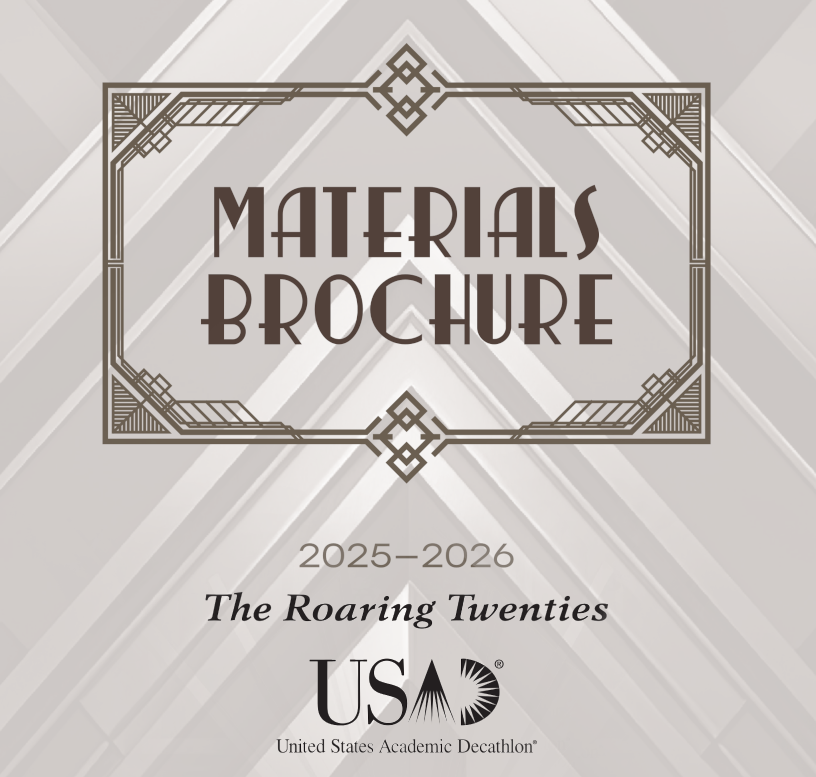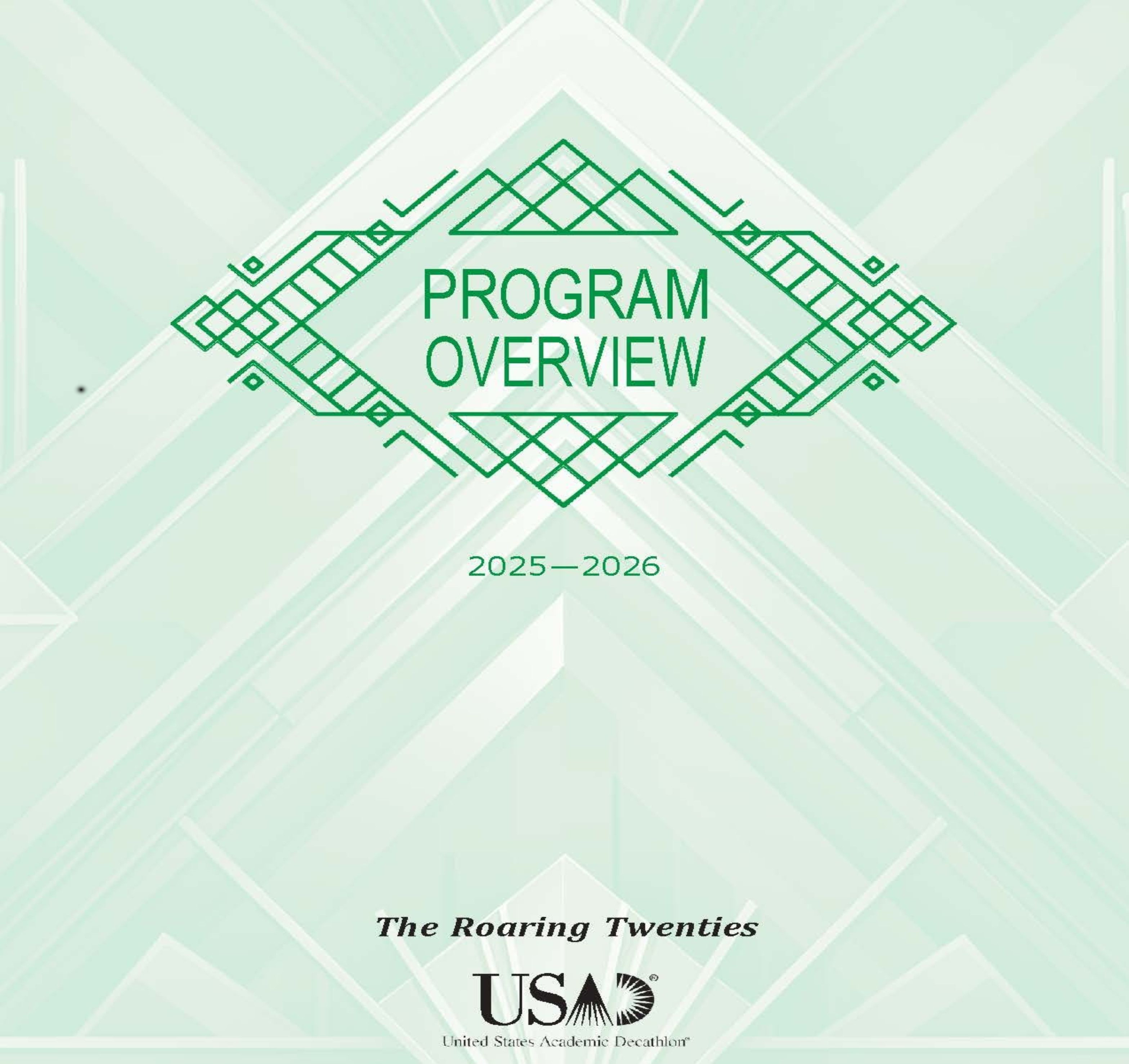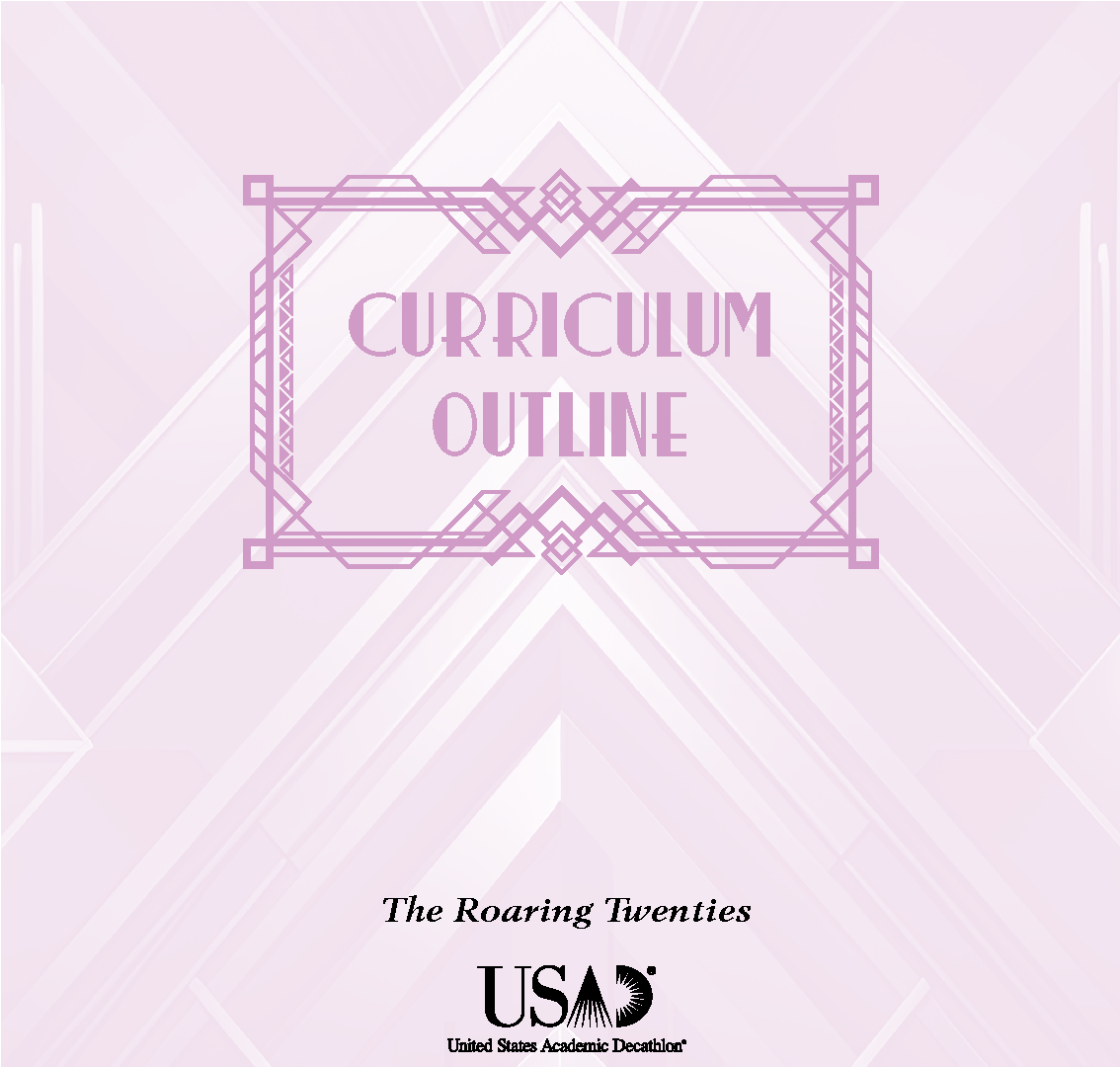United States Academic Decathlon® Curriculum
-
The U.S. Academic Decathlon® is excited to announce that the overall curricular theme for 2025–2026 will be The Roaring Twenties.
Following is some general information on the topics in each of the subject areas.
▪ ART: The art curriculum will offer an introduction to the art of the Jazz Age.
▪ ECONOMICS: The economics curriculum will cover fundamental economic concepts, microeconomics, and macroeconomics and will include a thematic section on the U.S. economy in the 1920s.
▪ LITERATURE: The literature curriculum will present an introduction to the literature of the Jazz Age and will include critical reading, one long work of literature, and selected shorter works. The long work of literature will be The Great Gatsby by F. Scott Fitzgerald.
▪ MATHEMATICS: The mathematics curriculum will provide an overview of algebra and trigonometry.*
▪ MUSIC: The music curriculum will focus on the music of the Jazz Age.
▪ SCIENCE: The science topic will be an introduction to electricity and magnetism.
▪ SOCIAL SCIENCE: The social science topic will be the Roaring Twenties.
The full subject area outlines will be posted on the U.S. Academic Decathlon website <www.usad.org> on May 1 and will be published in the U.S. Academic Decathlon Study Guide, which will be available on May 15.
* The 2025–26 mathematics curriculum and materials will be the same as were used for the 2022–23 U.S. Academic Decathlon.
United States Academic Decathlon® Curricular Topics for 2025–2026!
-
Art
Link: Art Resource Guide revised p. 59 Posted On:October 30, 2025In the Art Resource Guide, page 59, in the 8th line of the 2nd complete paragraph and the 4th line of the last paragraph, the spelling of Willard Van Dyck’s name should be corrected to read Van Dyke.
-
Art
Link: Art Resource Guide revised p.66 Posted On:October 6, 2025In the Art Resource Guide, page 66, in the 1st line of text in the section on the Chrysler Building, William Van Alen’s year of birth should be corrected to read 1883.
-
Economics
Link: Economics Resource Guide Revised p.5 Posted On:July 14, 2025In the Economics Resource Guide, page 5, column 1, paragraph 1, line 6, “Adam’s” should be corrected to read “Adam.”
-
Literature
Link: Revised Literature Resource Guide p. 48 Posted On:January 20, 2026In the Literature Resource Guide, page 48, column 2, in the 8th line of the 1st complete paragraph, “Thornstein” should be corrected to read “Thorstein.”
-
Literature
Link: Revised Literature Resource Guide pp. 65 and 93 Posted On:December 8, 2025In the Literature Resource Guide, page 65, column 1, the 2nd and 3rd lines from the bottom of the page should be corrected to read: “the youngest Supreme Court Justice, George Sutherland, was fifty-nine.” On page 93, the 2nd sentence of citation 157 should be corrected to read: “Mencken was even younger than the youngest justice, George Sutherland, who was fifty-nine.”
-
Literature
Link: Literature Resource Guide Revised p.12 Posted On:July 21, 2025In the Literature Resource Guide, page 12, column 1, in the 6th line from the bottom of the page, the start date for the Harding administration should be 1921.
-
Mathematics
Link: Mathematics Resource Guide revised p.104 Posted On:October 30, 2025In the Math Resource Guide and Math Instructor’s Manual, in the 3rd line of text from the top of the page, the end of the equation in bullet 2 should read sin B instead of sin A.
-
Music
Link: Music Resource Guide revised p.111 Posted On:October 6, 2025In the Music Resource Guide, page 111, in line 3 of the 2nd complete paragraph, “C–D–C” should be corrected to read “E♭–F–E♭.”
-
Music
Link: Revised Music Resource Guide p. 94 Posted On:July 14, 2025In the Music Resource Guide, page 94, Listening Guide 10, row 4:01, the fugue subject is 5 measures not 6 measures.
-
Science - Full-Color Figures
Link: Science - Full-Color Figures Zip File Posted On:Many of the Science Resource Guide figures are best viewed in full color. Students using the electronic version of the Science Resource Guide will have access to all full-color figures. Students using a black-and-white printed version of the Science Resource Guide can access figures that are best viewed in full color via the link above.
-
Science
Link: Revised Science Resource Guide p.77 Posted On:December 8, 2025In the Science Resource Guide, page 77, in the 3rd line of the last paragraph, “Telsa” should be corrected to read “teslas.”
-
Science
Link: Science Resource Guide revised p.113 Posted On:October 6, 2025In the Science Resource Guide, page 113, in the caption to Figure 119, “Michaelson” should be spelled “Michelson.”
-
Science
Link: Science Resource Guide revised pages 51 and 52 Posted On:September 29, 2025In the Science Resource Guide, Figure 42 and Figure 43 (on pages 51 and 52, respectively) were meant to be simplified diagrams. The revised versions of these two figures have been adjusted to more accurately depict circuits that would not short.
-
Science
Link: Science Resource Guide Revised p.24 Posted On:July 14, 2025In the Science Resource Guide, page 24, in the 1st line of the 4th paragraph, the two instances of the name “Van de Graff” should be corrected to read “Van de Graaff.”
-
Science
Link: Revised Science Resource Guide p.76 Posted On:June 4, 2025In the Science Resource Guide, page 76, in the 2nd equation from the top of the page, “(2(pi)r)” should be deleted from the left-hand side of the equation.
-
Social Science
Link: Revised Social Science Resource Guide p. 64 Posted On:December 8, 2025In the Social Science Resource Guide, page 64, the 3rd line from the bottom of column 1 should read: “…on the books for another forty years.”
-
Social Science
Link: Revised Social Science Resource Guide p.19 Posted On:September 8, 2025In the Social Science Resource Guide, page 19, column 2, in the 4th line of the 1st complete paragraph, “0.05%” should be corrected to read “0.5%.”
-
Social Science
Link: Revised Social Science Resource Guide pp. 22 and 32 Posted On:August 5, 2025In the Social Science Resource Guide, page 22, column 2, in the 7th line of the 1st complete paragraph, the spelling of “Marian” should be corrected to read “Marion.”
In the Social Science Resource Guide, page 32, column 2, the 2nd sentence of the 2nd complete paragraph should read: “Ford built more than one million cars in 1921, accounting for half of all cars made in the U.S.” The following sentence should be inserted as the penultimate sentence of this same paragraph: “In 1928, after nearly a decade, Ford’s massive complex at River Rouge became fully operational.”
-
Social Science
Link: Revised Social Science Resource Guide p. 52 Posted On:July 2, 2025In the Social Science Resource Guide, page 52, column 2, in the last sentence of the 3rd paragraph, the name of the author mentioned should be T. L. Stoddard, not T. L. Stoppard.
-
Social Science
Link: Revised Social Science Resource Guide p. 22 Posted On:June 23, 2025In the Social Science Resource Guide, page 22, column 2, in the 10th line of the 2nd complete paragraph, “ninth ballot” should be corrected to read “tenth ballot.”
-
Social Science
Link: Revised Social Science Resource Guide p. 20 Posted On:June 4, 2025In the Social Science Resource Guide, page 20, in the second to last line of column 2, “Twentieth” should be corrected to read “Twenty-First.”
Curriculum Updates
-
Social Science Resource Guide
The Supreme Court of Tennessee upheld the Butler Act’s constitutionality in 1927, and the law remained on the books for another forty years.
The Social Science Resource Guide, page 274. The sentence should read: The Supreme Court of Tennessee upheld the Butler Act’s constitutionality in 1927, and the law remained on the books for another forty years.
Pentathlon Curriculum Updates
-
The following is some general information on the topics in each of the subject areas:
USAD Curriculum Advisory Group The Curriculum Advisory Group is a panel of educators who assist in the development of the USAD curriculum by suggesting and providing feedback on curriculum topics and themes and by reviewing the subject area outlines, selected works of literature, artworks, etc. The members of the panel have expertise in a variety of subject areas and are experienced educators. Members of USAD’s Curriculum Advisory Group work on a voluntary (i.e., unpaid) basis.
USAD Curriculum Developers USAD hires curriculum developers in each subject area to develop the subject area outlines, Resource Guides, and Notebook Dividers. USAD’s curriculum developers are instructors at the university level. All of USAD’s curriculum developers have advanced degrees in their subject area and have experience in curriculum development. All applicants must submit a resume and writing sample to be considered as a curriculum developer for USAD’s materials. Writers are selected taking into account their qualifications and experience, their writing ability, and their familiarity with the Academic Decathlon® program.
USAD Curriculum Reviewers USAD hires curriculum reviewers in each of the subject areas. All curriculum reviewers have expertise in the subject area for which they are contracted and generally are teachers at the university level. All USAD curriculum materials are reviewed by two curriculum reviewers. All curriculum reviewers have an advanced degree in their subject area. All applicants must submit a resume to be considered as a curriculum reviewer for USAD’s materials. Reviewers are selected taking into account their qualifications and experience and their familiarity with the Academic Decathlon® program. All USAD Student Exercise Books except for mathematics are developed by a leading publishing solutions company that specializes in K-12 educational content. The Mathematics Student Exercise Books are written by authors who are either mathematics teachers at the university level or are graduate students in mathematics.
Student Exercise Book Development All USAD Student Exercise Books except for mathematics are developed by a leading publishing solutions company that specializes in K-12 educational content. The Mathematics Student Exercise Books are written by authors who are either mathematics teachers at the university level or are graduate students in mathematics.
United States Academic Decathlon Curriculum Development
-
We want people to share information about The United States Academic Decathlon®. Information such as program dates, names of state directors and USAD Board of Directors, program eligibility requirements, lists of our available products and other non-copyrighted material may be reproduced and shared with others. However, no part of our copyrighted materials (see listing of "Program Materials") may be reproduced or transmitted in any form or by any means, electronic or mechanical—including photocopying and recording—or by any information storage or retrieval system without permission in writing from USAD. Please also see our Electronic Materials License Agreement.
When in doubt...ASK!
USAD is a nonprofit organization, and we depend on sales of our materials to support the program's testing, materials development, national competition, scholarship funds, and administration. Unauthorized copying of materials is not only a violation of copyright law, but it also reduces our resources for running and improving the Academic Decathlon®. No USAD staff or board member personally profits from the sales of our materials, but Academic Decathletes all over the country do! Please don't shortchange them by reproducing USAD materials without permission.
United States Academic Decathlon®, U.S.A.D, USAD, Academic Decathlon®, U.S. Academic Decathlon®, and Super Quiz™ are trademarks of the United States Academic Decathlon® Association and may not be used in any way for commercial purposes without the express written permission of USAD. All rights reserved.



